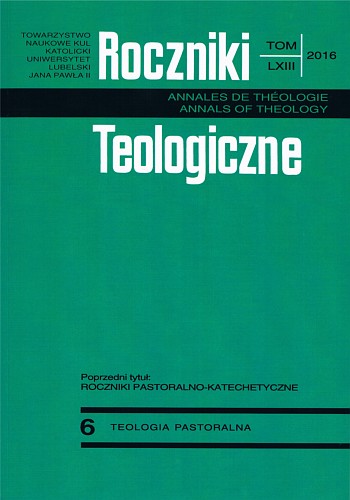Szlachetny choć nieco naiwny optymizm. Gaudium et spes o kulturze
High-minded, though somewhat gullible optimism Gaudium et Spes on culture
Author(s): Andrzej PotockiSubject(s): Christian Theology and Religion, Theology and Religion, Pastoral Theology
Published by: Towarzystwo Naukowe KUL & Katolicki Uniwersytet Lubelski Jana Pawła II
Keywords: religion; culture; Second Vatican Council
Summary/Abstract: The author comments upon a fragment of the pastoral constitution Gaudium et Spes concerning culture. This concerns the second chapter of the second part entitled “The Proper Development of Culture”. The commentary is written 50 years after the document was embraced by the Second Vatican Council, yet it is not intended as a jubilee commemoration. It looks at the conciliar work while taking into account what has been going on in culture over the past half century. The author highlights the unusual optimism of the conciliar fathers. He refers culture to the perfection of the human person, to the good of the community and to all of human society. They see in it a tool to perfect human talents and the way of his being with others. They state that the number of men and women aware of the fact that they create the culture of their communities is growing. The conciliar fathers seem to sing a praise hymn to culture. However, the mainstream cultural model of our times is a mass culture, that is, culture addressed to the utmost maximum number of recipients. It adjusts to their level, therefore, it resigns from the ambitions of high culture. Mass culture, due to the mediums it uses, has become media-culture. It is an over-technical culture, a culture which is for sale. It remains in the hands of those who hold power or money. The older culture, so-called “folk-culture”, was distinctively mobilizing. It was characterized by the identity of an artist and a recipient. A mass-media culture is by definition demobilizing. A consumer does not need to make any effort. He buys a product and satisfies himself with it. This type of culture does not help the individual person to grow; on the contrary, it makes him lazy. The conciliar fathers predicted that it would be different. But let us not complain about the authors of the document, rather, we should look at ourselves because we have not taken up the task properly. We, that is the creators and consumers of culture.
Journal: Roczniki Teologiczne
- Issue Year: 63/2016
- Issue No: 06
- Page Range: 75-91
- Page Count: 17
- Language: Polish

